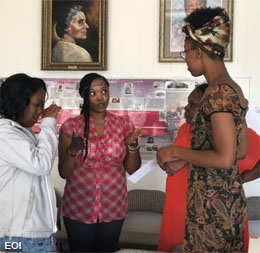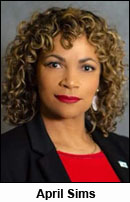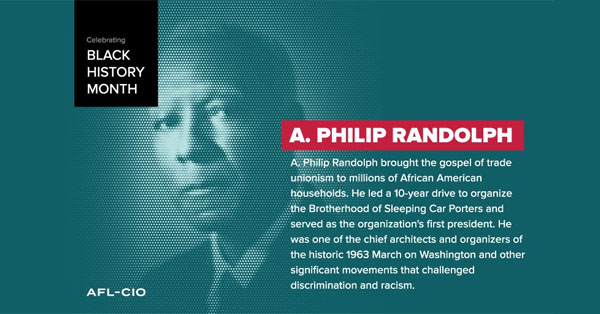OPINION
Black workers are organized labor’s bedrock — and future
If we are in true solidarity with everyone in our movement, we all win
By APRIL SIMS
(Feb. 28, 2020) — Black History Month has offered us the opportunity to lift up the significant role Black Americans have played in this country from before its founding. This is a complex history, both painful and joyful, but one that is important to honor. Black history is American history; it is also Labor history.
Black working people have been pivotal in advancing the cause of organized labor for generations. A. Phillip Randolph’s work forming the Negro American Labor Council played a central role in one of the landmark civil rights actions of the era, the 1963 March on Washington for Jobs and Freedom. The involvement of Black unionists in this action built the pressure needed to push the AFL-CIO to support the 1964 Civil Rights Act.
Black working people are the bedrock of organized labor, and are poised to play an even greater role in our movement as it becomes more and more diverse. For one, according to the Bureau of Labor Statistics, Black workers are now unionized at a higher rate than any other ethnic group (13.2% union, versus 10.8% and 9.2% for white and Latinx workers, respectively).
Broadly, the demographics of the labor movement are changing. Per the Economic Policy Institute (EPI), the working class — defined as working people without degrees — makes up 66 percent of the total workforce. EPI estimates that the working class will be majority-minority by 2032, 11 years before the total population of the U.S. becomes so. If we look at just members of the working class aged 25-34, this group of workers will be majority-minority in 2021.
But while more and more Black working people are joining the labor movement, increased representation doesn’t automatically translate into greater job security for Black folks.
The impacts of 250 years of slavery, decades of discriminatory employment practices, and more than 40 years of anti-worker policies cannot be erased solely by more Black folks joining the labor movement. Systematic disenfranchisement of Black workers carries a toll that persists, even when individual Black workers are organized and have access to resources.
 Recent research conducted by the Economic Opportunity Institute (EOI) with Black women eligible for Paid Family & Medical Leave (PFML) illustrates this point. In listening sessions led by EOI, participants aired their concerns with utilizing PFML. Per EOI, “as Black women, many felt that their employers and coworkers were more likely to suspect them of being ‘lazy’ and to retaliate against them if they took the full length of leave they might need.”
Recent research conducted by the Economic Opportunity Institute (EOI) with Black women eligible for Paid Family & Medical Leave (PFML) illustrates this point. In listening sessions led by EOI, participants aired their concerns with utilizing PFML. Per EOI, “as Black women, many felt that their employers and coworkers were more likely to suspect them of being ‘lazy’ and to retaliate against them if they took the full length of leave they might need.”
And when working people are under attack, often Black workers bear the brunt of these attacks. We saw this recently in the aftermath of the Unfair Labor Practice strike undertaken by workers at Providence Hospitals; workers who were denied access to their job sites after the strike were predominantly those in environmental, food, and hospitality services, jobs held largely by Black and Brown working people.
The unequal treatment Black workers continue to suffer should concern us all. Solidarity with all working people is fundamental to our movement. Moreover, our fates as working people are tied together, across race, ethnicity, geography, and sector. Data from the EPI shows that when the pay of Black, Indigenous and People of Color (BIPOC) decreases, there is no increase in pay for white workers. Similarly, when white workers’ pay decreases, there is no increase in pay for BIPOC workers. When one of us loses, we all lose; our fortunes as working people are fundamentally entwined.
2020 is a momentous year. We have unprecedented opportunities to fight for working people, to lift up candidates that will represent our interests. We know that our movement is the bulwark between working people and the forces that seek to enslave the human soul, as the Washington State Labor Council’s Constitution declares. But to fulfill this laudable ideal, we must truly be in solidarity with all members of our movement, supporting the growing ranks that will fight for all of us.
 April Sims is Secretary Treasurer of the Washington State Labor Council, AFL-CIO, representing the interests of more than 600 union organizations with approximately 550,000 rank-and-file members.
April Sims is Secretary Treasurer of the Washington State Labor Council, AFL-CIO, representing the interests of more than 600 union organizations with approximately 550,000 rank-and-file members.






